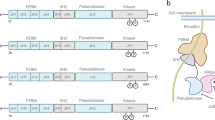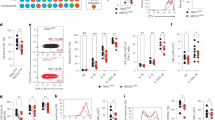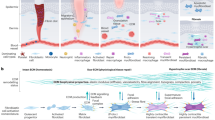Abstract
One of the most challenging issues of anti-inflammatory gene therapy is the complexity of inflammatory pathways. Transcription factor NF-κB plays a pivotal role in activation of multiple inflammatory molecules, and therefore represents the logical target for intervention. We evaluated the feasibility of suppressing the inflammatory responses in different cell lines through specific inhibition of NF-κB by gene transfer of IκBα, the naturally occurring intracellular inhibitor of NF-κB. The IκBα overexpressing cells were established using retroviral gene transfer or stable transfection with the wild-type (wt) IκBα cDNA. In all cell types, overexpression of wt IκBα resulted in a profound (>100-fold) increase of the IκBα message and a moderate (two- to three-fold) increase of the IκBα protein. The effects of the IκBα overexpression on the NF-κB activation and the inflammatory responses varied significantly in different cell lines. In conditionally immortalized human endometrial stromal cells, overexpression of IκBα prevented both interleukin-1 (IL-1)-inducible degradation of endogenous IκBα protein and activation of NF-κB. Accordingly, induction of cytokines interleukin-8 (IL-8) and Groγ was markedly suppressed. In monocytic THP-1 cells, both lipopolysaccharide (LPS)-inducible degradation of IκBα and NF-κB activation were only partially inhibited by overexpression of exogenous IκBα cDNA. None the less, the LPS-induced transcription of IL-1β and secretion of cytokines interleukin-6 (IL-6) and IL-8 were virtually abolished. In epithelial HT-29 cells, no inflammatory responses were inhibited. These results demonstrate the range of responses in various cell lines to gene transfer of IκBα and indicate the feasibility of suppression of inflammatory responses in appropriate target cells and their progeny by suppression of NF-κB.
This is a preview of subscription content, access via your institution
Access options
Subscribe to this journal
Receive 12 print issues and online access
$259.00 per year
only $21.58 per issue
Buy this article
- Purchase on Springer Link
- Instant access to full article PDF
Prices may be subject to local taxes which are calculated during checkout
Similar content being viewed by others
Author information
Authors and Affiliations
Rights and permissions
About this article
Cite this article
Makarov, S., Johnston, W., Olsen, J. et al. NF-κB as a target for anti-inflammatory gene therapy: suppression of inflammatory responses in monocytic and stromal cells by stable gene transfer of IκBα cDNA. Gene Ther 4, 846–852 (1997). https://doi.org/10.1038/sj.gt.3300461
Received:
Accepted:
Issue Date:
DOI: https://doi.org/10.1038/sj.gt.3300461
Keywords
This article is cited by
-
CD14 mediates the innate immune responses to arthritopathogenic peptidoglycan–polysaccharide complexes of Gram-positive bacterial cell walls
Arthritis Res Ther (2004)
-
Gene therapy for arthritis
Gene Therapy (2003)
-
Gene therapy for rheumatoid arthritis
Current Rheumatology Reports (2001)
-
Anti-inflammatory gene therapy directed at the airway epithelium
Gene Therapy (2000)



